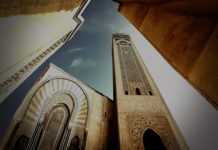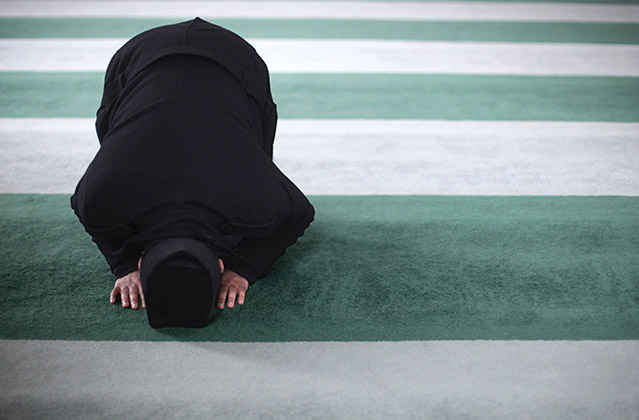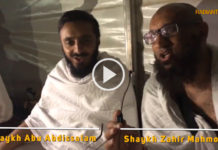In the name of Allah, the Most Merciful, the Bestower of Mercy.
Sujood ash-Shukr is a prostration which is performed for Allah, in order to show Shukr (thanks and gratitude) to Him for a specific blessing.
When is it performed?
No doubt every blessing is from Allah. He said,
{Whatever you have of blessing – it is from Allah} [16:53]
However Sujood ash-Shukr is not performed for blessings in general, rather it is only performed for a specific blessing at a specific time – such as a person being blessed with the birth of their child, getting a job or passing an exam. It can also be performed when a specific harm is alleviated from a person – such as being cured from an illness or being saved from calamity.
Evidence from the Sunnah
Upon the authority of Abu Bakrah (may Allah be pleased with him),
Whenever the Prophet (sal Allahu alayhi wa sallam) was pleased by a matter or was given the glad tidings of a matter, he would go into prostration as a form of Shukr to Allah. [1]
It has also been narrated about Ka’ab ibn Maalik (may Allah be pleased with him), when his repentance was accepted by Allah and the Prophet (sal Allahu alayhi wa sallam) stopped boycotting him, he prostrated to Allah. [2]
“The fact that Ka’ab ibn Maalik prostrated when he heard the glad tidings [of his sin being forgiven] is a clear evidence that this act was a common practice of the companions.
Abu Bakr as-Siddeeq prostrated when news reached him that Musaylamah the Liar had been killed. Alee’ prostrated when Dhul Thadiyyah had been killed among the Khawaarij. The Prophet (sal Allahu alayhi wa sallam) also prostrated when Jibreel gave him the glad tidings that whoever sends salutations upon the Prophet once, Allah will send salutations on that person ten fold…” [3]
How it is performed
As soon as a person hears of a specific blessing, it is recommended for him to immediately prostrate to Allah. This is a prostration like any other prostration – in terms of prostrating on seven limbs [4] and saying:
سبحان ربي الأعلى
Glorified is my Lord, the Most High
A person should then also thank Allah for the blessing.
There is no evidence however, for a person to say Takbeer at the beginning of the prostration, nor Tasleem after it.
Does a person have to be in a state of Wudhu?
“The correct opinion is that it is not obligated upon a person to be in a state of Wudhu when performing Sujood ash-Shukr. This is because the reason for performing it is due to an occurrence of a blessing or removal of a harm, and there is no specific time for this in which a person can prepare for it. In such a case, whenever a person is blessed, he should immediately perform Sujood ash-Shukr in whatever state he is in.” [5]
Innovations
There are a number of innovations and fabricated narrations which are occurring in relation to Sujood ash-Shukr:
1. Salaat ash-Shukr
It has not been narrated that the Prophet (sal Allahu alayhi wa sallam) dedicated a specific prayer called Salaat ash-Shukr. The only act of worship established is Sujood ash-Shukr – as mentioned above.
2. Performing Sujood ash-Shukr after each prayer or after reciting Qur’an
As mentioned previously in the Hadeeth, the Prophet (sal Allahu alayhi wa sallam) would only perform Sujood ash-Shukr on specific instances of good news or being saved from calamity. Therefore to introduce a new practice of performing a separate Sujood after each prayer is blameworthy and is a Bid’ah (an innovation).
3. Saying Alhamdulillah 3 times, or Shukr Lillah 3 times
To specify a saying or Du’aa in Islaam requires evidence that it was done by the Prophet (sal Allahu alayhi wa sallam) and his companions. It is not known that the above statements were specified to be said during Sujood ash-Shukr.
A Fabricated Narration
There is a narration which is mentioned by people in relation to Sujood ash-Shukr. It is,
“When the slaves of Allah do Sajdah-ul-Shukr, Allah opens the hijaab between them & the angels. He says to the Angels, ‘look at my slave, he did his fardh, obeyed my teachings and then performed Sujood to thank Me for what I’ve blessed him with.
‘Oh My Angels what should he get?’ The Angels will reply, ‘Ya Rabbana give him Your mercy.’
Then Allah will ask again, ‘and what else?’ The Angels will reply, ‘Ya Rabana give him Your heaven.’
Then Allah will ask again, ‘and what else?’ The Angels will reply, ‘Ya Rabana make his worries end.’
Then Allah Ta’aala will ‘ask what else?’
Every time Allah asks and what else?
The Angels will reply, something good to be given or be done to the person who does Sajdah-ul-Shukr.
Lastly the Angels will reply, ‘Ya Rabana we have no knowledge.’
Then Allah will say, ‘ I’ll thank him the way he thanked Me, I’ll give him My favour and show him My mercy’.” [End of narration].
Note: It should be known that this is a fabricated narration and has not been mentioned in the authentic books of Hadeeth and Sunnan. Rather it is a narration spread by the Rawaafidh Shee’ah in their books such as Bihaar al-Anwaar, Mustadrak al-Wasaail and others. [6]
It is therefore not permitted to spread this hadeeth, rather this fabrication should be clarified and warned against.
Allah knows best.
Written by the one in need of Allah,
Abul Abbaas Naveed Ayaaz
Nelson, Lancashire.
Footnotes
[1] Collected by Abu Dawood & Ibn Maajah
[2] Collected be Bukhari & Muslim
[3] Mentioned by al-Adheemabaadi in ‘Awnal-Ma’bood Sharh Sunan Abi Dawood
[4] The seven limbs that must touch the ground when prostrating have been mentioned in the following Hadeeth: “I have been ordered to prostrate on seven limbs: the forehead – and he also pointed towards his nose, two hands, two knees and the toes of the two feet. [Narrated by Ibn Abbaas; Collected by Bukhari & Muslim]
[5] Shaykh Ibn Uthaymeen; Fataawa noorun alaa ad-darb http://islamport.com/w/ftw/Web/2190/2457.htm
[6] Please refer to: http://islamqa.info/ar/135901















































